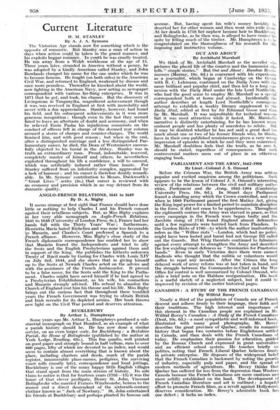PARLIAMENT AND THE ARMY, 1642-1904 • By Lieut.-Colonel J. S.
Omond
Before the Crimean War, the British Army was seldom popular and excited suspicion among the politicians. Such appears to be the lesson of Colonel J. S. Omond's interesting review of the relations between the civil and military autho- rities, Parliament and, the Army, 1642-1904 (Cambridge University Press, 10s. (id.). In Stuart days Parliament feared a standing army which the Crown controlled, and even when in 1689 Parliament passed the first Mutiny Act, giving the King legal power for .á limited period to maintain discipline in the force, it did not cease to be apprehensive. Throughout the eighteenth century the Army was starved in peace, so that every campaign in the French wars began badly and the Jacobite rising of 1745 found England almost defenceless until a few regiments were hurried back from Flanders. In the Gordon Riots of 1780--to which the author inadvertently refers is the "Wilkes riots "London, which had no police, might have been looted and burnt had not George III called out the Guards. But Whig theorists continued to fulminate against every attempt to strengthen the Army and described the few existing coast defences as "Seminaries for Praetorian bands." Even in early Victorian days there were-earnest Radicals who thought that the militia or volunteers would suffice to repel any invader. After the Crimea the long delayed work of army reform was at last taken in hand, and the struggle between the Commander-in-Chief and the War Office for control is well summarized by Colonel Omond, who adds a brief note on the Haldane reorganization. His book is a useful sketch of a neglected subject, but it could ho iMproved by revision of the earlier historical pages.










































 Previous page
Previous page